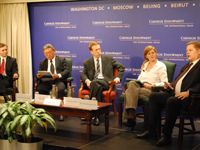Registration
You will receive an email confirming your registration.
Since its establishment just over ten years ago, the Community of Democracies has struggled to fulfill its potential. Critics have questioned its ability to go beyond talk to effective action in support of global democracy. In the past several years, the Community has made new efforts to sharpen its governance and set out practical lines of work. Proponents of the Community argue that it is now coming of age and deserves a second look from skeptics.
To examine whether this optimism is warranted and highlight current developments in the Community's work, the Carnegie Endowment hosted a panel discussion featuring Samantha Power of the U.S. National Security Council, Lithuanian Vice Minister for Foreign Affairs Evaldas Ignatavicius, Ambassador-at-Large of Mongolia to the Community of Democracies Suren Badral, and Tomicah Tillemann of the U.S. Department of State. Carnegie's Tom Carothers moderated.
Role of the Community of Democracies
The Community of Democracies was founded in June 2000 in Warsaw, Poland, with the goal of promoting common democratic values and standards and strengthening democratic institutions across the globe.
- Provide Advice: One of the chief roles of the Community is to provide advice to backsliding and emerging democracies, Ignatavicius said.
- Non-Western Democracies: The Community’s global membership provides clear proof that democracy is not synonymous with the West. In particular, Badral said, Mongolia’s presidency of the Community is significant because it shows that democracy is not only a Western system.
- Current Priorities: Badral described the main priorities for the Mongolian presidency as encouraging regional cooperation on democracy and promoting education for democracy.
- Education for Democracy: The Community’s education for democracy initiative will include an international seminar to discuss the pedagogical aspects of education for democracy and a high-level meeting between governments, private sector, and civil society to discuss how each can promote education for democracy, Badral added.
Challenges Facing the Community of Democracies
- Tangible Results: Initial enthusiasm for the Community of Democracies faded after the Community was unable to produce tangible results, Power said. However, the Community has found new life in recent years under the Lithuanian and Mongolian presidencies.
- Inclusivity: Under the Lithuanian presidency, efforts were exerted to make the Community more inclusive, Ignatavicius said.
Reinvigorating the Community of Democracies
- Internal Reform: Tillemann pointed to the newly-introduced governing council of the Community as an example of a meaningful reform. The governing council can respond to concerns about membership in the Community and provide a way for the Community to be more effective in its work. The implementation of this and other internal reforms has renewed general enthusiasm for the Community, Power added.
- U.S. Role: The United States has remained engaged with the Community and supported its reforms, and the Obama administration is committed to the Community and its efforts, Power stated.
- Role of Other Countries: Although the United States remains involved, other countries, such as India, are increasingly stepping up to support the work of the Community, Tillemann highlighted.
Arab Spring
- Timing: Power said that the Arab Spring is the ideal time for the active presidencies of Mongolia and Lithuania because there is demand for democracy support from countries like Tunisia and a willingness on the part of the Community to provide it.
- Relevance: The rise of democracy in North Africa is a reminder of the relevance of the Community of Democracies, Ignatavicius added.
- Democracy Education: Countries like Libya, which has little experience with democracy, are now going through democratic transitions, making the Community’s focus on education for democracy especially timely, Tillemann asserted.
